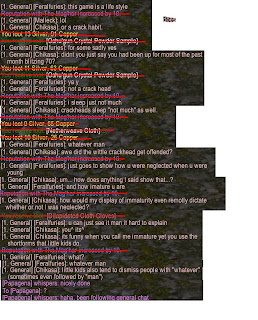People hate me. It is just a fact that when you whip out any form of logic, the general population of the internet feels the need to be belligerent, poorly so might I add. There have been many discussions started, particularly on facebook, on account of the lack of tolerance i have for forums (therefore giving them a wide space on the internet, especially 4chan), about such wonderful things as "grammar" or "punctuation" or "the lack of decent insults". All are true if you take time to consider it, grammar/spelling and correct typing were lost somewhere around the turn of the century, replaced by run-on sentances all typed out in this manner: "i seen u at teh moviz! lol ur soooo gay".
When correct grammar and/or spelling comes along, to correct mistakes, it is often met with 'insult'. There are usually some people who agree with the statements made, but a vast amount more that disagree.
Case and point: This Facebook Group where I started aparently a 'war' with a simple wall post. The importance of grammar and especially punctuation has been forgotton.
Look at the following sentences:Using intelligence is often the best route for insults, the people you are trying to stop from talking, will usually have to stop and think about what you just said. Or they will run and cry to their mommies, whichever comes first.
Don't stop.
Don't, stop.
The first is a request to continue with the action; the second is the exact opposite -- it's saying that the action should cease. (Cast your mind back to a couple of real-life situations you've experienced and just think of the ramifications of leaving out that little punctuation mark!)
Commas are used to indicate a short pause -- they alert the reader to the fact that the next thought will be connected to the one that has preceded it. (A full stop tells the reader that a new thought is about to start.)
Some writers adopt the "when in doubt, leave it out" approach, but, as we've already seen in the example above, the placement of a comma can radically alter the meaning of a sentence:
He was kicked by a mule which annoyed him. (The mule annoyed him.)
He was kicked by a mule, which annoyed him. (Being kicked annoyed him.)
Sometimes, omitting a comma can lead to ridiculous meanings:
While mother was cooking the baby wandered away.
Often, commas have to be used to avoid ambiguity in sentences:
You don't really like it; you're only pretending to please me.
You don't really like it; you're only pretending, to please me.
These sentences have two quite different meanings -- as a result of the placement of the comma.

really hoping this whole post made sense, that goes a little out the window as I get more tired... and tired is what I am.
